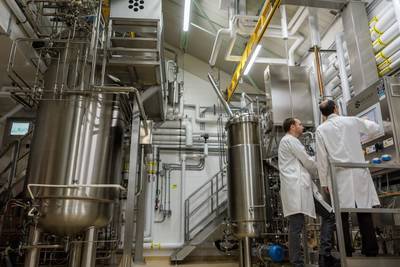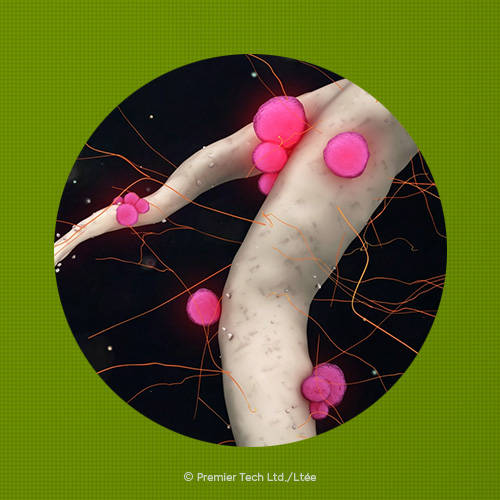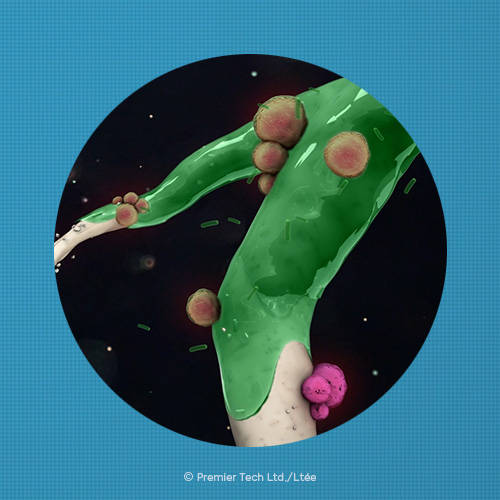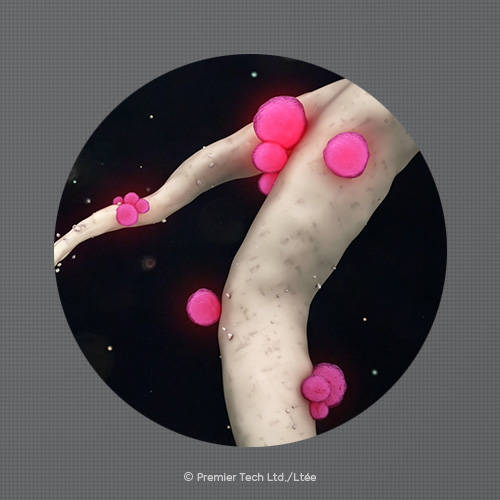
Biological Active Ingredients Working together to enhance plant performance, quality and yield
In agriculture and horticulture, biological active ingredients refer to living microorganisms, such as bacteria or fungi, that enhance plant growth, help them absorb nutrients more efficiently and promote a healthy root zone environment.
At Premier Tech, we are studying these biologicals and selecting the ones that deliver superior performance for growers. We produce and commercialize endomycorrhizal fungi and bacteria including Bacillus and Rhizobium. Additionally, we recently added Serendipita, another fungus species, to our portfolio. These biologicals are integrated into various product categories, such as growing media and inoculants, to provide our customers with distinctive value-added products.
Soils naturally contain biologicals, but their quantity and efficacy vary depending on various factors such as soil composition, humidity and cultural practices. Adding microorganisms, molecules or extracts to the soils aims to give plants a favorable environment for their growth. In time, the intensive use of soils can decrease the number of microorganisms naturally present. It is also true for growing media which generally contain no microorganisms.
 Mycorrhizae
Mycorrhizae
PTB297 Technology - Rhizophagus irregularis (formerly known as Glomus intraradices)
Mycorrhizal fungi have existed since the first plants appeared on dry land more than 450 million years ago. AMF (Arbuscular Mycorrhizal Fungi) symbiosis applies to over 80% of all plants and plays a major role in plant nutrition and productivity. Mycorrhizal fungi and plants form a reciprocally profitable association, the symbiosis called mycorrhizae. There are two types of mycorrhizae:
- Ectomycorrhizae is an association that occurs at the surface of roots.
- Endomycorrhizae is an association that occurs inside root cells.
Our mycorrhizae technologies
 Bacillus
Bacillus
PTB180 Technology - Bacillus Pumilus
PTB185 Technology - Bacillus inaquosorum
Bacillus is a genus of rod-shaped, gram-positive bacteria. This genus of bacteria with more than 260 species is found in various environments, from soil to water, and some species have significant medical and industrial importance. Bacillus is a bacterium that provides a healthy root zone which leads to better yields. As a root colonizer, it stimulates the plant to grow more efficiently. It is selected for its beneficial action of growth stimulation.
Our Bacillus technologies
 Rhizobium
Rhizobium
PTB160 Technology (pulses) - Rhizobium leguminosarum biovar viciae
PTB162 Technology (soybean) - Bradyrhizobium japonicum
PTB161 Technology (chickpea) - Mesorhizobium onobrychidis
Rhizobium bacteria live and thrive in symbiosis in root nodules produced by the plant. They are responsible for fixing the atmospheric nitrogen and making it available for the plant. Approximately 20% of all legumes such as soybeans, lentils and peas form mutualistic relationships with rhizobium.
Our rhizobium technologies
 Serendipita
Serendipita
PTB299 Technology - Serendipita indica (formerly known as Piriformospora indica)
The beneficial fungus Serendipita indica, a natural microorganism, forms an association with the roots of many plants such as canola and cereals. It induces some of the plant gene expression and promotes phytohormone production.
Our Serendipita technologies

Premier Tech Expertise & Distinctiveness
Over 40 years, Premier Tech has mastered unique large-scale manufacturing for the highest-quality biological active ingredients. Our innovation led to the production of efficient endomycorrhizal inoculants under aseptic conditions, defying norms and setting new industry standards. Expanding into Bacillus, rhizobium, and Serendipita-based solutions, we offer tailored products for horticultural and agricultural needs, enhancing value for clients.






